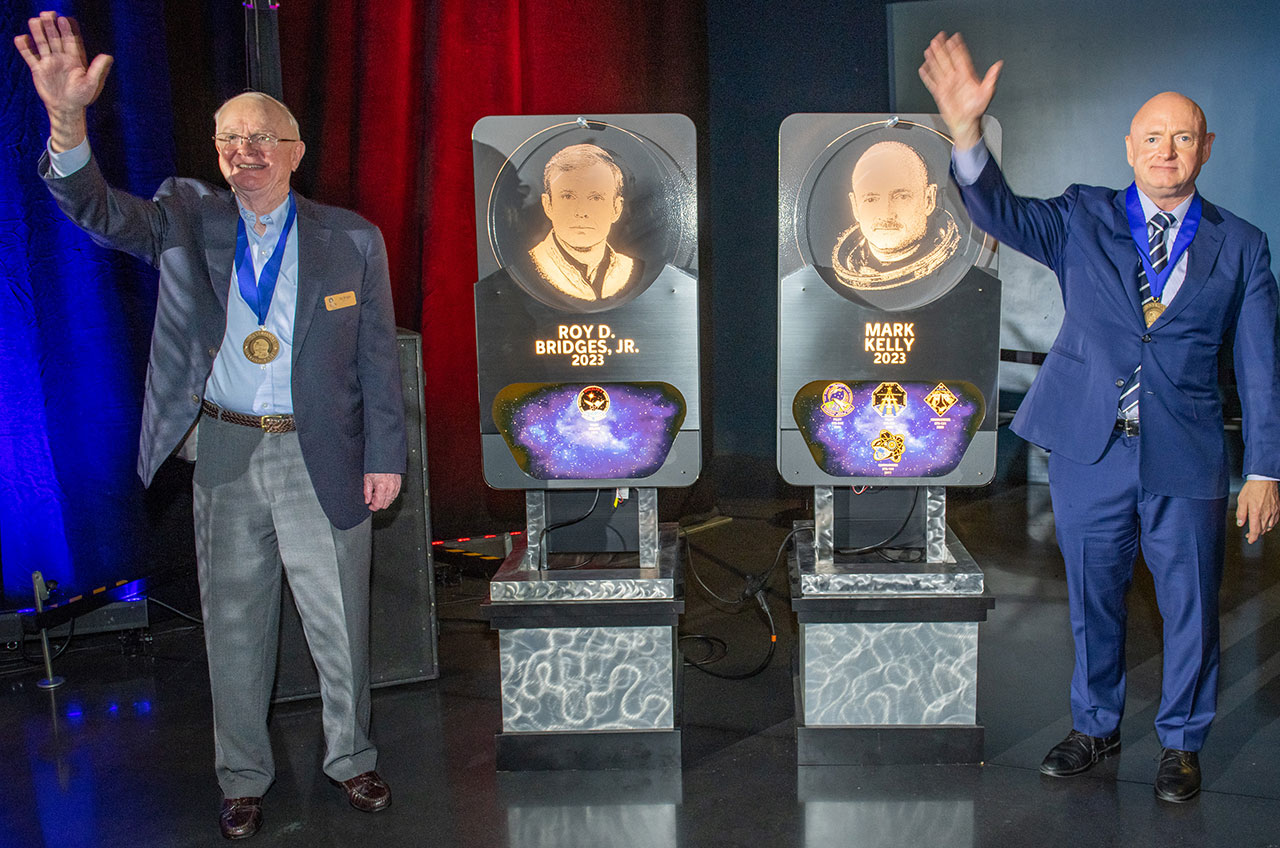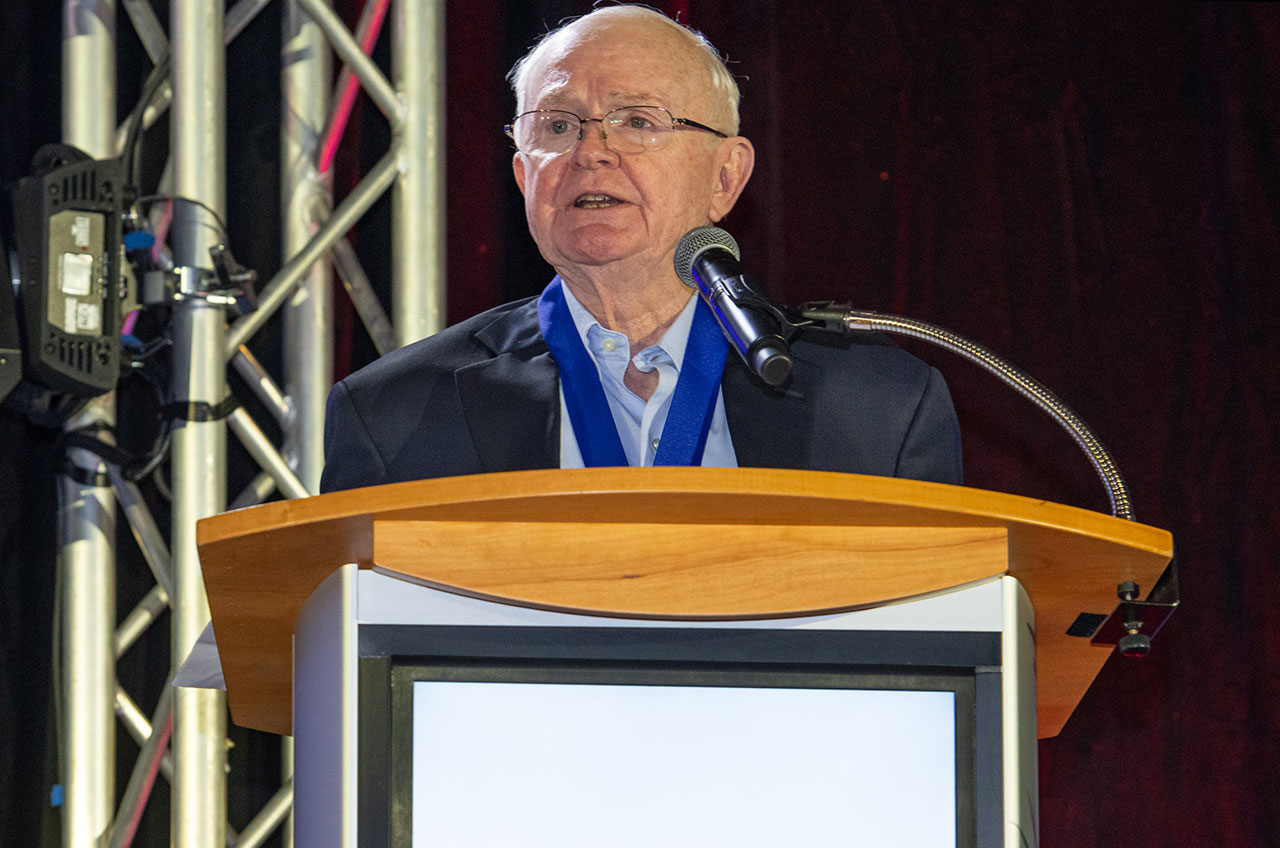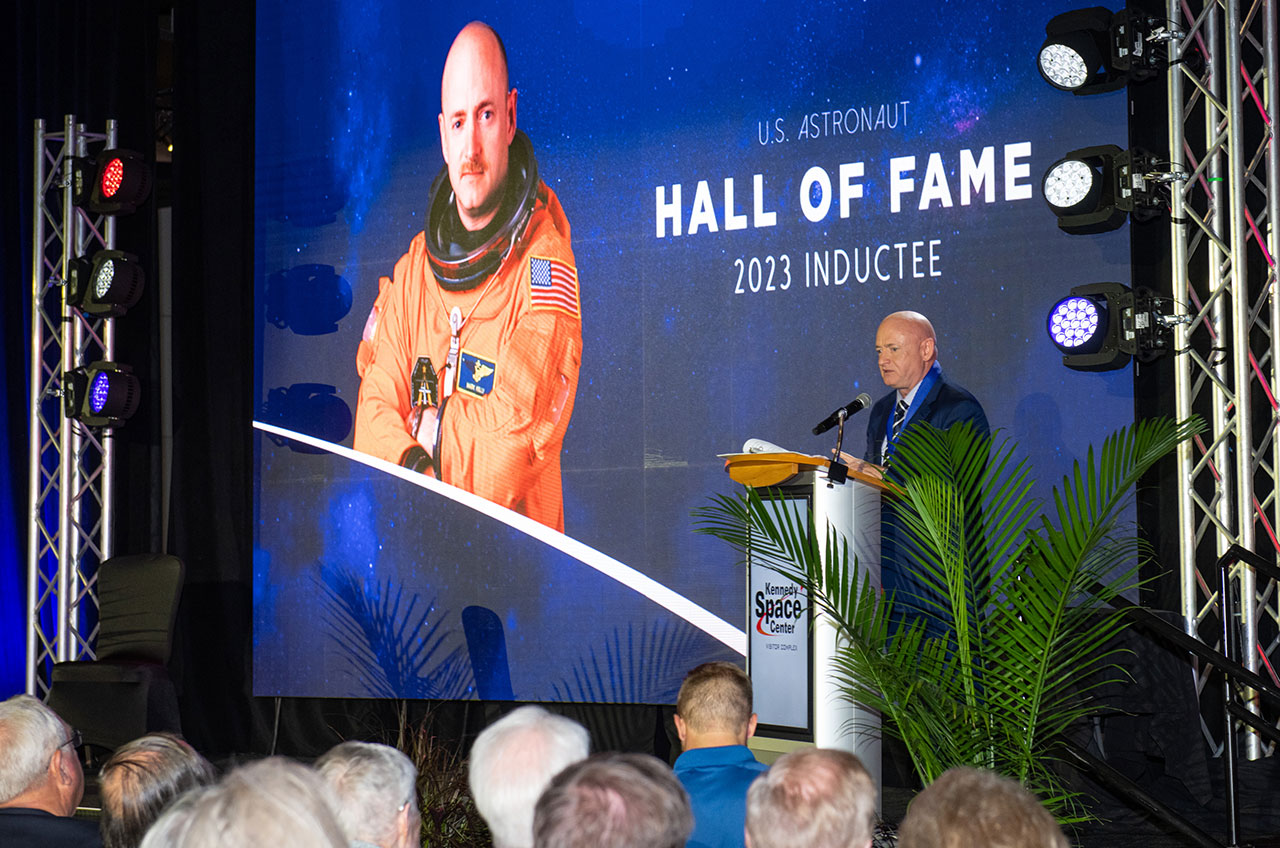Roy Bridges, Senator Mark Kelly inducted into US Astronaut Hall of Fame
'It's a great honor, having your peers recognize the things you did and consider them important enough to put you on stage...'

A retired general and a sitting senator were honored by their peers as the newest inductees into the U.S. Astronaut Hall of Fame.
Retired Major General Roy Bridges (U.S. Air Force) and Senator Mark Kelly (D-AZ) were hailed on Saturday (May 6) at a public ceremony held under the display of the space shuttle Atlantis at Kennedy Space Center Visitor Complex in Florida. The two astronauts flew on other orbiters in NASA's now grounded fleet, Bridges as pilot and Kelly as both pilot and commander.
"Roy flew the space shuttle when I was in college," said Kelly, who was selected with NASA's 16th class of astronauts in 1996, 11 years after Bridges made his first and only spaceflight. "He loomed large within the astronaut office."
Related: Biography of former NASA astronaut Mark Kelly
"Mark and his twin brother got a lot of notoriety as Scott was up on the space station for almost a year and they [scientists] were trying to see what space does to our human bodies. It was a pretty spectacular experiment,' said Bridges, referring to the NASA Twins Study, which was the first time scientists were able to study identical siblings while one was in Earth orbit. (Scott Kelly was inducted to the Astronaut Hall of Fame in 2021.)
"I think we are still the only siblings that have flown into space — less you count the Bezos brothers," said Kelly. Billionaire Jeff Bezos and his brother Mark became space tourists on the first crewed suborbital flight of Blue Origin's New Shepard launch vehicle in 2021.

Bridges and Kelly spoke separately with collectSPACE.com with about their entrance into the Astronaut Hall of Fame.
"I thought the time had passed when I would be considered [for this honor] because I retired from NASA in 2005 and I only had the one spaceflight because of the Challenger mishap and getting recalled to the Air Force," said Bridges.
A self-described "Improbable Astronaut" (the title of his autobiography) due to his upbringing in rural Georgia, Bridges' first and only launch was on the eighth flight of the space shuttle Challenger, STS-51F, in July 1985. As pilot, it was up to Bridges and commander Gordon Fullerton to execute the only abort to orbit in the shuttle program's history after one of the orbiter's three main engines prematurely cutoff. Challenger made it safely into space but entered a lower-than-planned orbital altitude. Still, the crew carried out the flight's objectives successfully.
Following the loss of space shuttle Challenger in 1986, the Air Force reassigned Bridges to the first in a series of leadership roles, including heading the largest test wing at Edwards Air Force Base in California, commanding the Eastern Space and Missile Center at Patrick Air Force Base in Florida and helming the Air Force Flight Test Center back at Edwards. After retiring from the Air Force, Bridges returned to NASA, serving as Kennedy Space Center director from 1997 to 2003 and then the director of Langley Research Center in Virginia from 2003 to 2005.
"I didn't know how much weight they would put on my leadership activities, running large organizations," said Bridges of the Hall of Fame nominations committee, a blue ribbon panel of inductees, retired flight controllers, historians and journalists overseen by the Astronaut Scholarship Foundation. "I just didn't know whether or not they would consider those in their deliberations. Apparently they did."

Kelly noted that his role as Senator may have played some role in his selection, too, but felt it was likely more about his accomplishments in space. Kelly is only the third astronaut to be elected to the U.S. Senate and only the second sitting senator to be enshrined in the Hall of Fame after founding-member John Glenn.
"There aren't a lot of people that have made four trips to the space stations," said Kelly. "I was also the last to command space shuttle Endeavour; I was the commander of the mission that brought up the Japanese laboratory, which I think was the heaviest or one of the heaviest things ever flown on the orbiter; and I commanded the mission that launched the $2 billion Alpha Magnetic Spectrometer [AMS], which i think was the most valuable thing launched to the space station."
"When we added AMS, it was considered assembly complete of the International Space Station, so I was the commander of the flight that finished off the space station," Kelly said.
Kelly logged 54 days and two hours in space, flying on Endeavour's STS-108 and STS-134 missions in 2001 and 2011, respectively, and on Discovery's STS-121 and STS-124 flights in 2006 and 2008.

Five of Kelly's former crewmates, including Mike Fossum and Ron Garan who flew with Kelly twice, were among the more than 30 astronauts attending Saturday's ceremony. Pam Melroy, who was inducted into the Hall of Fame alongside Scott Kelly in 2021 and who today serves as NASA's deputy administrator, introduced Kelly for induction.
One of Bridges' crewmates, John David-Bartoe, was also at the ceremony, as was 2022 inductee David Leestma, who introduced Bridges.
"Dave Leestma lived in my neighborhood in Texas when we we at Johnson Space Center. I saw him often," said Bridges.
Bridges and Kelly comprise the 24th class of Astronaut Hall of Fame inductees. Plaques bearing their glass-etched portraits and mission patches were revealed during Saturday's ceremony and will be hung alongside the 105 other honorees as part of the Heroes & Legends attraction at the visitor complex.
"In a couple of months I'll be 80 years old, so it's kind of like a cap on my career," said Bridges. "It's a great honor, having your peers recognize the things you did and consider them important enough to put you on stage with a U.S. senator."
"It's nice to be recognized by your colleagues and other astronauts for your career," said Kelly. "A little bit of me feels like everybody who climbs into a rocket should be in the Astronaut Hall of Fame, but I do appreciate the recognition."
Get the Space.com Newsletter
Breaking space news, the latest updates on rocket launches, skywatching events and more!
Follow collectSPACE.com on Facebook and on Twitter at @collectSPACE. Copyright 2023 collectSPACE.com. All rights reserved.
Join our Space Forums to keep talking space on the latest missions, night sky and more! And if you have a news tip, correction or comment, let us know at: community@space.com.

Robert Pearlman is a space historian, journalist and the founder and editor of collectSPACE.com, a daily news publication and community devoted to space history with a particular focus on how and where space exploration intersects with pop culture. Pearlman is also a contributing writer for Space.com and co-author of "Space Stations: The Art, Science, and Reality of Working in Space” published by Smithsonian Books in 2018.In 2009, he was inducted into the U.S. Space Camp Hall of Fame in Huntsville, Alabama. In 2021, he was honored by the American Astronautical Society with the Ordway Award for Sustained Excellence in Spaceflight History. In 2023, the National Space Club Florida Committee recognized Pearlman with the Kolcum News and Communications Award for excellence in telling the space story along the Space Coast and throughout the world.










